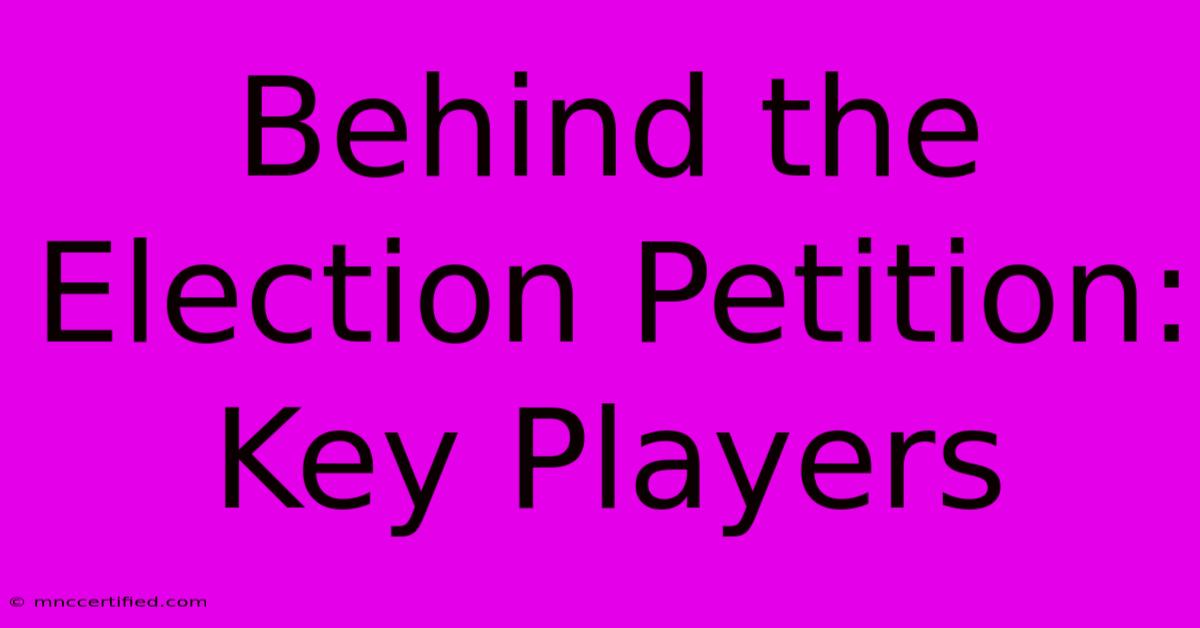Behind The Election Petition: Key Players

Table of Contents
Behind the Election Petition: Key Players
Election petitions, the legal challenges lodged after a close election, often involve a complex web of individuals and institutions. Understanding the key players is crucial to grasping the intricacies of these high-stakes battles. This article delves into the roles and influence of the major actors involved in an election petition.
The Petitioner: The Challenger
The petitioner is the individual or group initiating the legal action. They claim irregularities or illegalities in the election process that affected the outcome. Strong evidence is paramount; mere allegations are insufficient. The petitioner's legal team meticulously gathers and presents evidence, such as witness testimonies, voting records, and expert analysis, to support their claims. Their credibility and the strength of their evidence significantly impact the petition's success. A high-profile petitioner with considerable public support might exert more pressure on the electoral body and the courts.
Key Characteristics of a Successful Petitioner:
- Strong evidence of electoral malpractice: This forms the bedrock of their case.
- A credible legal team: Expert lawyers specializing in election law are essential.
- Public support and media attention: Generating public awareness can increase pressure on the electoral commission and the courts.
- Financial resources: Legal battles are expensive, requiring substantial funding.
The Respondent: The Elected Official
The respondent is the elected official whose victory is being challenged. They are tasked with defending their win, often through their legal team. Their defense strategy focuses on discrediting the petitioner's evidence, highlighting procedural flaws in the petition, and demonstrating the validity of the election results. The respondent's resources and political influence can play a significant role in the outcome.
The Respondent's Strategies:
- Presenting counter-evidence: Refuting the petitioner's claims with their own evidence.
- Highlighting procedural irregularities: Challenging the legal process followed by the petitioner.
- Utilizing political influence (potentially): This can involve leveraging their network and connections to sway public opinion or influence the legal process (though this should be within ethical and legal boundaries).
The Electoral Commission: The Overseer
The electoral commission is the independent body responsible for overseeing the election. Their role in an election petition is crucial. They often provide crucial documentation, such as voter registration lists and polling station records. The commission's impartiality is vital; any perception of bias can undermine the credibility of the entire process. The commission's actions, or perceived inaction, can influence public perception and the eventual court ruling.
The Commission's Responsibilities:
- Providing relevant documentation: Offering evidence crucial to the case.
- Maintaining neutrality: Acting impartially throughout the process.
- Ensuring transparency: Openly providing information to all parties involved.
The Judiciary: The Arbitrator
The judiciary, specifically the courts hearing the petition, ultimately decides the outcome. Judges meticulously review the evidence presented by both sides, applying the law to determine whether the election was conducted fairly and legally. Their decisions carry significant weight and can have far-reaching consequences for the political landscape. The independence and integrity of the judiciary are paramount for upholding the democratic process.
The Judiciary's Role:
- Impartial adjudication: Fairly weighing the evidence from all parties.
- Applying the relevant laws: Making decisions based on established legal frameworks.
- Issuing a binding judgment: Their decision is final, unless appealed.
Other Key Players:
- Observers: International and domestic election observers can provide valuable insights and reports, adding another layer to the evidence considered.
- Experts: Experts in various fields (statistics, forensics, etc.) can offer analysis and testimony, shaping the legal arguments.
- The Media: The media plays a crucial role in disseminating information to the public, shaping public opinion, and holding all parties accountable.
Understanding the roles of these key players provides essential context for following and analyzing election petitions. The interplay between them determines the success or failure of a challenge, underscoring the importance of transparency, fairness, and the rule of law in maintaining a healthy democracy.

Thank you for visiting our website wich cover about Behind The Election Petition: Key Players. We hope the information provided has been useful to you. Feel free to contact us if you have any questions or need further assistance. See you next time and dont miss to bookmark.
Featured Posts
-
Elizabeth Line Suspended London Underground Disruption
Nov 27, 2024
-
Arsenals Tierney Returns
Nov 27, 2024
-
Coles I M A Celeb Departure Explained
Nov 27, 2024
-
Injury Blow Barcelonas Brest Test
Nov 27, 2024
-
Sporting Cp Star Misses Arsenal Clash
Nov 27, 2024